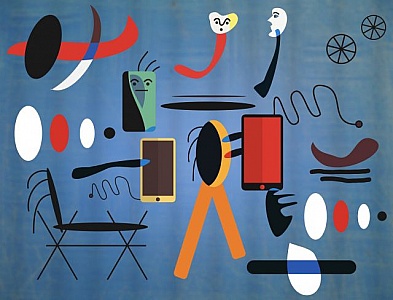
Hourly chaotic scrolling of the feed in social networks, cursory glances at TOP-5 news and the subsequent inevitable sticking to them, as well as countless transitions on subscriptions with hot news - all this is part of the dangerous everyday life of millions of people.
And if someone believes that each news piece contributes to personal erudition, he is mistaken: the disordered consumption of information through digital devices damages the nervous system, generates chaos of superficial assimilation of information and wasting time.
The author of these lines was also hostage to the dopamine loop created by the continuous stream of news and rapid transitions from link to link. All this happened ten to fifteen times a day, often accompanied by empty discussions in the comments. How we managed to overcome this dependence - in this article.
News in the palm of my hand
If in the era of analogue media, television zapping and its extreme form - grazing were considered the apotheosis of media addiction, then the digital age, which gave us “the whole world in our pocket,” has radically changed the practice of news consumption. Today, only a few look in the mailbox for a crisp, fresh newspaper, and fewer and fewer rush to the evening news releases. Relevant content is right under our fingers. And for all the benefits of instant personal access to information and an abundance of entry points, such accessibility hides an inevitable side effect - a non-chemical dependence on constant news streams.

An Unhelpful Source of Knowledge
Unlike virtual communication or online games, when we are aware of the entertaining nature of such a pastime, news consumption has an insidious property: subconsciously, we perceive news as a useful source of knowledge, the basis for making vital decisions. This behavior is justified by various kinds of "who owns the information, he owns the world," although who owns whom, let's say a little later.
In most cases, news content about events in the world, country, city, or in the immediate vicinity does not carry any payload for the reader. If a person scanning the news in a subway car is asked to briefly convey the essence of the material just read at the exit, he will do it with great difficulty or will not be able at all. The news message thus becomes a cognitive junk, and the daily routine of scanning "on the go" harms memory and concentration.
The Dangers of Hot News
Particular risks are associated with the consumption of news about political events or high-profile statements by public figures, as well as about tragic incidents. All of these hot news, or rather their clickbait headlines, produced by journalists and editors of publications on the web, provoke an instant expression of the reader's personal attitude through emoji likes and comments. An active commentator, in the presence of responses to his opinion from other readers, receives a powerful injection of dopamine, stimulating a constant check of fresh replies, cues and the number of new likes.
Thus, the news lover who comes across is also addicted to the world’s assessment of his reaction to the event (no matter whether it is sincere or provocative), which makes him spend more and more time in the news space (an effect well known to users of social networks).
News addiction triggers
This pattern is based on the triggers of our daily habits. By analogy with cigarettes, coffee, alcohol, internet addiction, and its faithful companion - being addicted to news, is the result of unconscious actions of external stimuli and our emotional reaction to them.
This effect is described by Nir Eyal in Hooked. On hook", where the chain of forming habits is revealed to constantly update mail, check new messages in messengers and social networks. With regard to news surfing, everything is the same: links on the start pages of search engines (Yandex, Rambler, Mail.ru) and mobile browsers (Opera, Chrome), as well as Push notifications, pop-up windows - all these are "embedded triggers", carefully presented by manufacturers of software and content to increase customer engagement (read, aggravate addiction).

News feeds: why do we need all this?
What prompts us to get into a smartphone, standing in a traffic jam on the way to work, open a tab on an office computer, and start chaotically studying a bunch of new events with catchy headlines?
- , . , .
- . – . ( – !) , .
- Cultivating pseudo-competence. Thanks to being in a constant flow of information, we create a mental construct of an erudite - a person who is aware of the latest events and trends, an informed interlocutor. This consumption of news is comparable to unstructured navigation through hyperlinks when trying to learn a new phenomenon or concept. The result of such knowledge is a superficial and fragmentary idea of something, empty and useless knowledge.
Regardless of the reasons for constantly surfing the news, daily unreasonable practice leads to the desire to receive more and more information from the Internet news, and the brain - additional servings of cheap dopamine.
How to deal with it: personal experience
If we discard the scenarios of rejection of digital and total news nihilism, it is possible to independently regulate our relations with this sphere while maintaining the usual way of life. Moreover, it will not work at all to hide from the news, even if you wish: there will be those who at lunch decide to tell us the latest news or drop a link by mail.
The author, who for a long time could not imagine his everyday life without referring to political and socio-economic events from the TOP news, realized the perniciousness of this habit, having applied the algorithm for working with consciousness. Here is a list of actions taken.
- . «?». – ., , , . - – , «, », – , .
- . « – » . : , . – 10 -12 .
- . , , , , , - . , .
- . , . . 21.00 9.00 – . , . , . . Wi-fi.
- . , . Telegram , . ( – ya.ru, Google ). , .
References:
1. Olds J. “Self-stimulation of the brain; its use to study local effects of hunger, sex, and drugs ". Science. 127 (3294): 315-24.
2. Travkina N." Dophanomics: how the market deceives our brain and how to stop checking a smartphone 80 times a day. "
3. Eyal N. "Hooked. On the hook. How to create habit-forming foods."